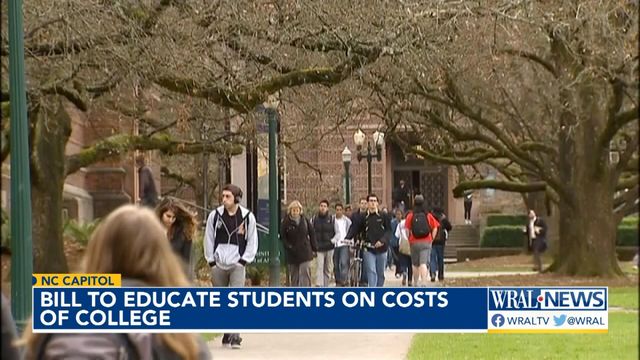Cost of college could soon be a 10th-grade topic in North Carolina
High school students in North Carolina could soon get an education about the cost of a four-year college degree, as well as more information about vocational and technical programs. That proposal passed a key committee Wednesday.
Posted — Updated"For the last couple decades, maybe longer, there's almost been this messaging that you need to go to a four-year institution to succeed. In many cases, that’s not how it is anymore," Johnson told WRAL News. "The cost and benefit ratio can often be better going to a trade school or getting these certifications, degrees, an apprenticeship."
Johnson said his bill isn't intended to steer anyone away from college. However, he he said critical skilled jobs are going unfilled while students rack up record-setting student debt at four-year colleges. He said his bill is aimed at 10th graders who may not yet have a clear idea of what they want to do.
"Plumbing, electrical work, automotive mechanic—those are high-demand jobs right now, where people can stay in the area where they were born and raised and make a great living and start a family and career there," Johnson told the committee. "We just want to make sure people know what their options are."
The state's College Foundation website already features a "Know Before You Go" college planner, but it doesn't include trade or technical programs.
Rep. Tim Longest, D-Wake, asked Jackson how educators would calculate the average cost of a four-year degree, since loans and tuition vary widely.
"As I’m sure you know, there are many different ways that student loans could be obtained through private or public loans, and then different repayment plans, so the rate may vary considerably from student to student," Longest said.
Longest told WRAL News he supports the idea of the bill, but he's concerned about how it will be implemented, and whether it could make middle-income families think college is out of reach for their student when that may not be true.
"Particularly, if they’re just given a big number of how much student loans they’re going to have to take out, or how much tuition is, without knowing that our state has real options for paying that down, financial aid packages, not just through the college but through the state itself," Longest said.
Longest said he's interested in "making sure students have all of those numbers on the screen as well, ideally in a way that's simplified enough for them to easily understand their options for colleges and universities, so they know those paths are open to them."
Johnson said he's open to working with Longest and stakeholders to design an online dashboard that teachers can use to help students compare their options.
"I think when you put those numbers in front of somebody, going, you can go to the community college here, go through one of these apprenticeship programs and come out making great money, owing very, very little, that’s going to be appealing to a lot of people," Johnson told WRAL News.
The bill still has a long way to go, but there's a similar proposal in the House budget that would fund career counseling in middle school.
Related Topics
• Credits
Copyright 2024 by Capitol Broadcasting Company. All rights reserved. This material may not be published, broadcast, rewritten or redistributed.





